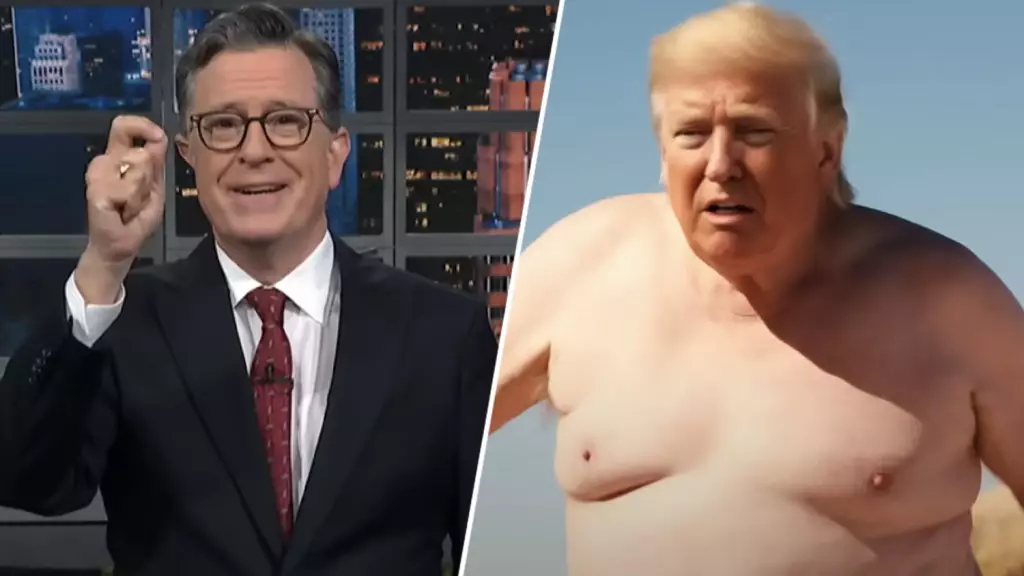In an era where the boundaries of satire and free speech are increasingly being tested by political and corporate power, South Park’s recent season premiere serves as a defiant statement of artistic independence. The show’s daring depiction of Donald Trump, utilizing deepfake technology to portray him nude—an act that pushes the limits of satire—underscores a broader cultural struggle. This episode not only lampoons the former president’s manifested ego, but it also questions the limits society places on freedom of expression, especially in the context of AI regulation. When the show’s creators, Matt Stone and Trey Parker, choose to confront such an iconic figure with grotesque humor, they remind us that satire remains a potent tool to hold power accountable, even amid mounting censorship.
AI and the Fight for Artistic Autonomy
Recent political moves to deregulate artificial intelligence have created an environment ripe for innovation—yet, this freedom is double-edged. South Park’s use of deepfake technology to craft controversial imagery of Trump exemplifies AI’s dual capacity: as a means for extraordinary creativity and as a tool for potential misuse. Colbert’s jocular endorsement of the episode’s content, sarcastically aligning government deregulation with the cartoon’s mockery, reveals a deeper truth: artistic expression often flourishes precisely when challenged. By mocking Trump’s exaggerated self-image and shedding light on sensitive topics, South Park demonstrates that creative boundaries should not be dictated by political or corporate interests, but by the integrity of free thought and expression. If innovators are stifled, art becomes hostage to censorship, and society loses an invaluable mirror held up to power.
Satire as a Weapon Against Oppression
The episode’s relentless critique of Trump’s antics—ranging from his bizarre painting to his personal insecurities—illustrates the power of satire to expose the absurdities of leadership. When Parker and Stone incorporate biting commentary about Trump’s alleged vulnerabilities, they remind viewers that humor can serve as a form of resistance. The inclusion of provocative elements, like the PSA about Trump’s “tiny penis,” exemplifies how satire strips away veneer and confronts uncomfortable truths. Such fearless comedy challenges the notion that political figures are beyond reproach, asserting that humor can be a catalyst for social dialogue and change. It’s a reminder that, even in a world increasingly divided by misinformation and censorship, creative voices can still push back powerfully against tyranny.
The Struggle Between Corporate Interests and Artistic Integrity
Behind the scenes, the conflict is equally telling. Paramount’s recent dealings—signing a lucrative deal with Parker and Stone while simultaneously facing backlash for canceling controversial shows—highlight a complex dance between profit motives and artistic integrity. The suspension of Colbert’s show, following a costly settlement with Trump, exemplifies how corporate interests may suppress dissent to protect their financial interest. Yet, these challenges also underscore the resilience of original content creators who refuse to surrender their voice. South Park’s unapologetic satire demonstrates that commercial success does not have to come at the expense of honesty and boldness. Instead, it may serve as a catalyst to reclaim narrative control in an industry often swayed by political pressures.
Hope Through Humor in a Turbulent World
At its core, the episode and Colbert’s comments signal a glimmer of hope: despite increasing restrictions and societal polarization, humor remains a vital tool for critique and liberation. The act of ridiculing a figure as polarizing as Trump in such a brazen manner exemplifies the unwavering resilience of satire. It reinforces the belief that, through creative audacity, society can challenge oppressive forces and foster a climate where free expression is celebrated rather than suppressed. While power players may attempt to silence dissent, the enduring power of humor and satire ensures that these voices remain alive and influential. South Park’s recent antics serve as a rallying call—reminding us that, as long as the creative spirit survives, hope for a freer, more honest discourse endures.

